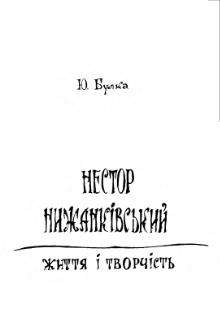Nestor Nyzhankivsky
| Nestor Nyzhankivsky | |
|---|---|
| Native name | Нестор Нижанківський |
| Born |
January 24, 1863 Mali Didushychi (now Stryi district of Lviv region). |
| Died |
April 12, 1940 Lodz. |
| Resting place |
At the Stryi city cemetery. .jpg) Tomb of where was buried Nestor Nyzhankivsky (1893-1940). Stryi. |
| Religion | UGCC |

Nestor Nyzhankivsky (Nestor Ostapovych Nyzhankivsky) (Ukrainian: Не́стор Оста́пович Нижанкі́вський[1]); August 31, 1893, Berezhany Ternopil region now – April 12, 1940, Lodz, Poland (Son Ostap Nyzhankivsky) – Ukrainian composer, pianist and music critic. Was an avant-garde composer who received his doctoral degree in history from Vienna University and graduated from the Prague State Conservatory.
Live
Nestor Nyzhankivsky was born August 31, 1893, (Berezhany) in the family of the composer, conductor, a Greek Catholic priest Ostap Nyzhankivsky. Nyzhankivsky family moved to Stryi in 1900, where Nestor finished school and gymnasium. Then he studied at the Higher Music Institute Mykola Lysenko Lviv.[2]
During the First World of War was drafted into the army, was taken prisoner, where he returned in 1918.
He received a PhD in history from Vienna University (1923) and graduated from the Prague State Conservatory (1927) in the master class of Vítězslav Novák.
He returned to Galicia to teach piano and theory at the Lysenko Higher Institute of Music in Lviv (1931-39) and became one of the founders (and first chairman) of the Union of Ukrainian Professional Musicians (SUPROM).[3]
He died in exile April 12, 1940 in Lodz.
The remains of Nestor Nyzhankivsky reburied in cemetery of the city Stryi November 1993, near the tomb of his parents.
Composer and musical activities
Nestor Nyzhankivsky composer after itself left a great artistic heritage. It's compositions for fortepiano: "Prelude and Fugue on a Ukrainian Theme in C Minor",[4] "Piano Trio in E Minor", "Little Suite", "Intermezzo in D Minor", and "Variations on a Ukrainian Theme in F Sharp Minor". Art songs for voice and piano: "Ty liubchyku za horoliu" (My Beloved beyond the Mountain, text by U. Kravchenko), "Zasumui trembito" (Trembita's Dirge, text by R. Kupchynsky), "Naimyt" (The Hireling, text by I. Franko) and so on.